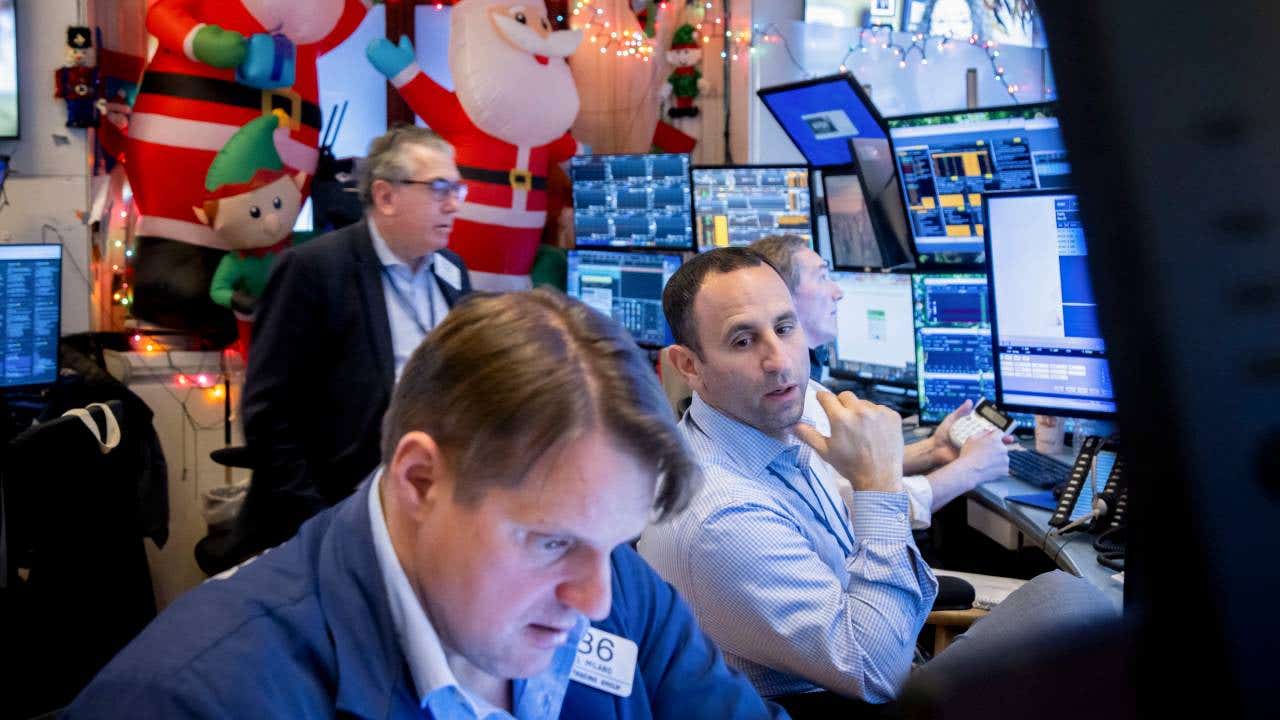Survey: Experts share the top overlooked investment themes that deserve more attention in 2025

Stocks have mostly been on a tear in 2024, with the S&P 500 up more than 23 percent as of mid-December. But the strong performance has left stocks trading at elevated valuations, and the Federal Reserve has signaled it needs to see more progress on inflation in order to cut interest rates further in 2025.
So, what should investors look out for as they plan for 2025? Bankrate’s Fourth-Quarter Market Mavens survey asked market pros what overlooked themes investors should consider, how monetary policy will impact stock market performance, and what risks and opportunities investors should watch out for as the GOP takes control of Congress and President-elect Donald Trump returns to the White House.
The analysts surveyed expect a fairly normal, but slower-paced 7 percent return for the S&P 500 over the coming year, but there are still risks to watch out for.
“There’s a world of uncertainty facing investors, including the variables of fiscal and monetary policy here at home,” says Mark Hamrick, Bankrate’s senior economic analyst. “What will the president and GOP-led Congress do? How will the Federal Reserve respond? What will inflation and growth look like? It is prudent to assess both the risks and opportunities.”
Forecasts and analysis:
This article is one in a series discussing the results of Bankrate’s Fourth-Quarter 2024 Market Mavens Survey:
- Bond forecast: Pros see 10-year Treasury yield falling modestly in 2025
- Survey: Experts share the top overlooked investment themes that deserve more attention in 2025
- Survey: Pros say stock market investors should brace for a slower pace of returns over coming year
How will the Fed impact stocks in 2025?
Monetary policy can have a significant impact on how investors view risk assets such as stocks. According to the latest data, 70 percent of survey respondents see Fed policy being supportive for stocks in 2025. Just 10 percent see monetary policy as a negative for stocks next year, while 20 percent view it as neutral. The survey period ended a few days before the Fed’s final Federal Open Market Committee meeting of the year, where it signaled a slower pace of rate cuts in 2025.
“Rate cuts tend to be supportive of equity performance, but the core driver is the growth outlook,” says Dec Mullarkey, managing director at SLC Management. “With inflation down and earnings estimates up, that provides compelling fundamental support for stocks to do well.”
Other analysts said investors should watch how long-term interest rates respond to the federal deficit.
“All else equal, a Federal Reserve removing policy restraint is a supportive factor for stocks,” says Patrick J. O’Hare, chief market analyst at Briefing.com. “How much support comes through in that action will have a lot to do with how the bond market deals with deficit issues. The Fed doesn’t control long rates, which impact equity valuations. A spike in long-term rates wouldn’t bode well for equities.”
Chris Fasciano, senior portfolio manager at Commonwealth Financial Network, sees monetary policy as a negative for stocks in 2025.
“Rates will come down, but not to the extent the market will be hoping for,” Fasciano says. “However, fiscal policy will possibly offset this impact as 2025 unfolds.”
Risks and opportunities for investors as GOP takes control of Congress, White House
Investors appeared to cheer the results of the November elections, as Republicans took control of Congress and President Trump was reelected to the White House. Stocks and other assets rallied on the possibility of lower taxes and fewer regulations, but there are still risks to watch out for.
“The challenge with evaluating the GOP economic agenda is that it contains the prospects of stimulus from tax cuts and lighter regulation but also comes with offsets from the threat of tariffs and deportations,” Mullarkey says. “That mix is hard to handicap, but markets are betting that growth will be prioritized and the net effect will be market friendly.”
Other analysts are more optimistic.
“The first Trump administration slashed regulations and it seems like they are going to do it again,” says Kim Forrest, chief investment officer at Bokeh Capital Partners. “It was a huge driver of the economy and we believe that it will enable companies to show higher growth again.”
Still, Trump’s unpredictable nature could create confusion and uncertainty around which policies will actually be implemented.
“It’s difficult if not impossible to discern when President Trump is bluffing, posturing, or actually pursuing policy,” says Michael Farr, CEO of wealth management firm Farr, Miller & Washington. “It’s purposefully disruptive and upsetting to markets. Trump can use these tools to a productive end, but the process can be very messy.”
Overlooked investment ideas to consider
With stocks not far off all-time highs, driven by strong returns for large-cap growth companies, it can be difficult to find attractive investment ideas. But the analysts surveyed still see underappreciated ideas and themes for 2025.
“During periods of high growth, but high geopolitical risk, one investing style that deserves attention is large-cap high-dividend companies,” Mullarkey says. “Across the S&P 500, many of the top dividend payers are real estate, financials, utilities and consumer staples. This group derives most of its revenue from domestic sources and could be a decent hedge against geopolitical risk and the threat of tariffs.”
Some analysts still see opportunities around the boom in artificial intelligence.
“To date, most of the excitement (and returns) has accrued to the largest players in the space,” says O’Hare. “The AI trade will remain prominent, although we expect the AI ‘underlings’ to outshine the largest AI players in 2025 as investors broaden their return horizons in the AI space.”
However, others are more skeptical about whether AI can deliver returns on the timeline investors expect.
“I think Wall Street is assuming that productive uses of generative AI are right around the corner and I think the timeline is too short,” Forrest says. “Investors getting excited about a technology in the beginning, then disappointed that it is taking too long to show economic uses is a theme in technology investing. I think we are nearing the time when investors ask the hard questions of what problem does this solve and who is willing to pay for it.”
Editorial Disclaimer: All investors are advised to conduct their own independent research into investment strategies before making an investment decision. In addition, investors are advised that past investment product performance is no guarantee of future price appreciation.
Why we ask for feedback Your feedback helps us improve our content and services. It takes less than a minute to complete.
Your responses are anonymous and will only be used for improving our website.






